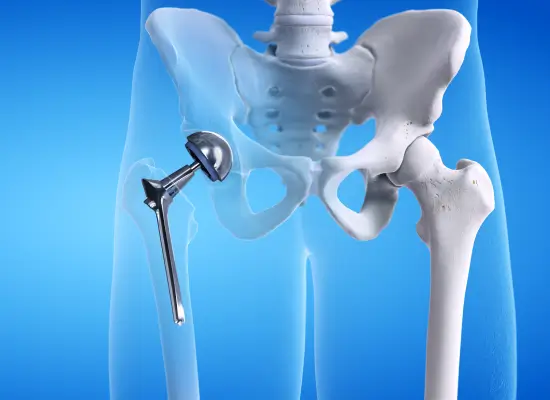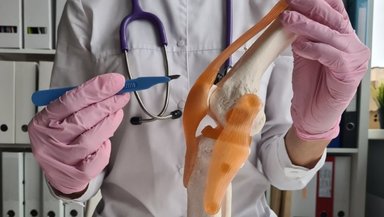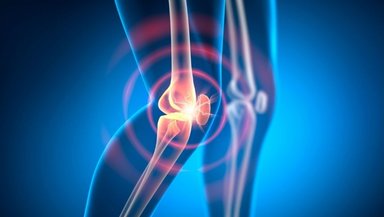Depending on implant type, lifestyle factors, and individual health status, hip replacements can last between 15 and 20 years or more.

- Synopsis
- What Is Total Hip Replacement?
- Conditions Treated with Total Hip Replacement
- Benefits of Total Hip Replacement
- Is Hip Replacement Surgery Right for You?
- What to Expect Before Hip Replacement Surgery
- Recovery from Hip Replacement Surgery
- Why Choose Gleneagles Hospital for Hip Replacement Surgery?
- Conclusion
Synopsis
The ability to perform basic duties is hampered by excessive hip pain and limited mobility, which have a significant negative effect on the quality of life. In order to assist patients in restoring their mobility and getting rid of their pain, Total Hip Replacement (THR) works as a microsurgical procedure that replaces damaged hip joints with artificial parts. Gleneagles Hospital implements state-of-the-art hip replacement services using advanced technology with experienced orthopaedic surgeons. The facility operates as a top-rated medical centre for hip replacement while providing individualised care and maximum surgical results.
The article explains the advantages as well as surgical methodologies of hip replacement alongside patient rehabilitation and establishes how Gleneagles Hospital emerges as the top hospital for patients undergoing this procedure.
What Is Total Hip Replacement?
When the hip has been damaged by arthritis, fractures (a break in a bone), or other illnesses, simple daily activities such as walking or transferring in and out of a seated position can also be painful as well as difficult. If symptoms are not sufficiently relieved by pharmacologic intervention, adjustment of activities, and walking aids, one may want to have total hip replacement surgery.
Total hip replacement (THR), sometimes referred to as hip arthroplasty, is a surgical procedure used to replace a damaged or arthritic hip joint with an artificial prosthetic implant. Patients are able to resume their usual activities after the intervention, which restores function, reduces discomfort, and greatly enhances quality of life.
Conditions Treated with Total Hip Replacement
The effective treatment of many hip problems that cause long-term pain and impairment is total hip replacement or THR. For example, arthritis is the most common reason.
- Osteoarthritis: Joint cartilage deterioration brought on by ageing, which causes stiffness and discomfort. Often occurs in individuals over 50 or those with a family history.
- Rheumatoid Arthritis: An autoimmune condition leading to inflammation of the joints, cartilage destruction, and stiffness.
- Posttraumatic Arthritis: This develops during a serious hip fracture or injury, which eventually causes cartilage degradation.
- Avascular Necrosis (Osteonecrosis): Bone tissue necrosis due to reduced blood supply, usually resulting from hip dislocations or fractures.
- Hip Fractures: THR may be required for severe fractures that cannot mend on their own.
- Developmental Dysplasia & Childhood Hip Disease: Hip dysplasia or abnormal hip formation can cause instability and arthritis in the future.
Gleneagles Hospital, the best hospital for hip replacement surgery, offers specialised care and tailored treatment regimens for patients in need of hip replacements in order to maximise recovery.
Benefits of Total Hip Replacement
Opting for hip replacement at Gleneagles Hospital provides several life-changing benefits, helping patients regain mobility and comfort.
- Pain Relief: Long-standing hip pain brought on by arthritis, fractures, or other degenerative diseases is effectively eliminated by Total hip replacement surgery, greatly improving everyday comfort.
- Improved Mobility: Patients who have their hip joints restored are able to move more freely and carry out daily tasks like walking and climbing stairs.
- Enhanced Quality of Life: Hip replacement improves physical and mental health by reducing pain and increasing mobility, enabling individuals to lead active, independent lives.
- Long-Lasting Results: Modern hip implants are designed to endure a long time; they often survive 15 to 20 years or longer, reducing the need for revision surgery.
- Minimally Invasive Options: Advanced surgical techniques allow patients to resume their regular activities more rapidly since they leave fewer scars, smaller incisions, and shorter recovery periods.
Your health matters – get expert advice today.
Is Hip Replacement Surgery Right for You?
Deciding on hip replacement should be a collaborative decision involving you, your family, your primary care doctor, and your orthopaedic surgeon. Typically, the process begins with a referral for an evaluation by a specialist.
Your orthopaedic surgeon may suggest a total hip replacement if you experience:
- Persistent hip pain that limits daily activities like walking or bending.
- Pain that continues even while resting, day or night.
- Stiffness in the hip is restricting movement or leg lifting.
- Inadequate relief from medications, physical therapy, or mobility aids.
All patients are eligible for the surgery, regardless of their age or weight. Patients between the ages of 50 and 80, as well as younger individuals with juvenile arthritis and older people with degenerative arthritis, have all had successful hip surgery treatments. Gleneagles Hospital stands out as a top facility for expert treatment of hip replacements.
What to Expect Before Hip Replacement Surgery
Approximately two to three weeks before your admission in the hospital, you will be booked for a pre-assessment session if you have a hip replacement scheduled. You will have the necessary tests; the medical team will inform you of your admission plans and provide you with physiotherapy advice to help you regain your mobility. A specific physiotherapy session could be suggested.
In order for surgery to take place, please notify the hospital of any diseases or skin issues (cuts, rashes, etc.) that may develop between the pre-assessment and admission.
Prior to surgery, your hip replacement surgeon will consult with the anaesthesiologist to decide whether to use regional or general anaesthesia. For a speedier recovery, spinal anaesthesia is typically recommended.
As one of the best hospitals for hip replacement, Gleneagles Hospital ensures comprehensive care for your procedure and recovery.
During the Surgery:
- Anaesthesia: The process is painless under spinal or general anaesthesia.
- Incision and Access: Access to the hip joint is possible through a carefully planned incision that causes the least amount of disruption to nearby tissues.
- Damaged Tissue Removal: Affected cartilage and bone are removed with meticulous care, taking care to leave as much healthy bone as possible.
- Implant Placement: The prosthetic components, which might be made of plastic, ceramic, or metal, are securely fastened using press-fit techniques or speciality cement.
- Joint Alignment: To guarantee natural mobility and prevent difficulties, surgeons must align themselves properly.
- Closure: Along with a sterile dressing, the wound is sealed with staples or sutures.
Post-Surgery Care:
- Hospital Stay: Usually two to four days under careful supervision.
- Pain Management: Compression clothing, ice, and medications reduce discomfort and swelling.
- Physical Therapy: Begins within a day to prevent stiffness and restore mobility.
- Movement Restrictions: Avoid bending past 90 degrees or crossing your legs or knees too soon.
- Dietary Advice: Diets high in protein can help in recovery.
- Follow-up: Regular appointments to monitor progress and adjust rehabilitation plans.
The team of experts at Gleneagles Hospital ensures that every aspect of post-operative care is optimised for a smooth and successful recovery.

Recovery from Hip Replacement Surgery
Enhanced Recovery Program: A shorter hospital stay lowers the chance of problems such as blood clots and infections. In order to promote early mobilisation, Gleneagles Hospital has an Enhanced Recovery after Surgery (ERAS) program. Depending on factors including age, motivation, and how well the patient responds to physiotherapy interventions, the majority of patients are released from the hospital with the help of occupational therapists and physiotherapists in a period of two to four days.
Discharge & Physiotherapy: To enable a good recuperation process, a discharge date is chosen at the time of admission. The physiotherapist will assess your growth and determine when it is safe for them to release you. It is important to continue doing the exercises as prescribed for a few months following discharge, even if more physiotherapy appointments might not be necessary.
Pain Management: Pain after surgery is expected. Pain medications include spinal or nerve injections and patient-controlled analgesia.
Expected Outcomes: Around 95% of the patients undergoing hip replacement surgery experience a remarkable improvement in their quality of life. However, about 5% may have persistent symptoms or problems. Some of the common side effects are numbness, bruising, swelling, mild tenderness, and a sore back.
The best hospital for joint replacement is well-known for competent and effective care in hip replacements.
Why Choose Gleneagles Hospital for Hip Replacement Surgery?
Multiple factors make Gleneagles Hospital the top medical hub for hip replacement procedures.
- Expert Orthopaedic Surgeons: Skilled in traditional and minimally invasive techniques.
- Advanced Technology: 3D imaging and robotic-assisted technologies for precise implant placement.
- Personalised Treatment Plans: Individualised medical evaluations and recovery goals.
- Enhanced Recovery Protocols: Integrates pain management with physiotherapy and mobility training.
- Multidisciplinary Team Approach: Collaboration among surgeons, anaesthetists, physiotherapists, and nutritionists.
- State-of-the-Art Facilities: Advanced equipment and stringent infection control measures.
- High Patient Satisfaction: Consistently positive feedback reinforces exceptional care.
Choosing Gleneagles Hospital means opting for unmatched expertise, advanced technology, and a patient-centric approach that prioritises safety, comfort, and successful outcomes.
Conclusion
Total hip replacement (THR) is a dependable treatment option for chronic hip conditions that result in mobility impairments. Gleneagles Hospital demonstrates exceptional proficiency in executing hip replacement to ensure patients receive the highest standard of care. Contact our specialists to discover suitable surgical solutions that enable an active lifestyle without pain
Dr Basavaraj C M
HOD & Sr Consultant - Orthopaedic Specialist & Joint Replacement Surgery
MBBS, D Ortho, DNB (Ortho), MRCS (Glasgow), FRCS (Trauma and Ortho), Fellowship in Arthroplasty (UK)
Dr Brahmaraju T J
Sr Consultant - Orthopaedics & Joint Replacement Surgery
MBBS, D Ortho, DNB (Ortho), MS (Ortho), Fellowship in Joint Replacement, Fellowship Arthroscopy (Germany)
Dr Anup Khatri
Senior Consultant
MBBS, DNB, Fellowship in Joint replacement(Zimmer Biomet), Fellowship in Foot and Ankle Surgeries(IFAS-UAB) USA
Dr Girish Bhalerao
Senior Consultant
MBBS,MS(Ortho), International fellowship in Sports, Trauma, Arthroscopy and Arthroplasty
Dr V V Satyanarayana E
Consultant
MBBS, MS (Orthopaedics), MCh Trauma (UK), AO Fellow Trauma & Arthroplasty (Greece)
Frequently Asked Questions
The majority of patients regain the ability to walk by using supports between 24 and 48 hours after surgery.
The recovery period lasts between 4 and 6 weeks but may vary based on your job requirements.
Gleneagles Hospital emerges as a top hospital for hip replacement surgery because of their dedicated expertise, advanced technology, and personalised patient care.



























